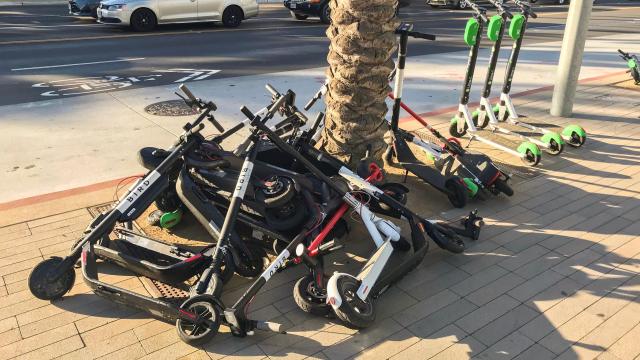Scooter rental company, Bird, has officially boarded the struggle bus. The micro mobility provider sent out emails to current and past customers requesting that they settle their lingering debts earlier this month. And the company left no stone unturned in its quest to recoup revenue.
In some cases, Bird users were asked to pay back amounts of under a dollar, according to multiple tweets and screenshots initially compiled in journalist Ali Griswold’s Substack newsletter, Oversharing. Negative account balances as small as $US0.55 ($1) and $US0.62 ($1) were included in the round-up.
“This email is to inform you that we’ve run into an issue trying to charge your payment method,” begins the company’s formal email. The message then goes on to politely ask that the recipient update their payment info and warns that, if they don’t comply, they “won’t be able to start any new rides.”
@BirdRide I put in $20 and had a bad first ride experience. I wrote you about what went wrong which you never responded to, and now you send me this petty dunning letter for $0.55. I’m gonna fly the coop. pic.twitter.com/OQkDz5C2pe
— Paul Hess (@idea2go) December 7, 2022
On top of the notably measly pay requests, Bird also appeared to be reaching out to customers who hadn’t used its service in years. Based on tweets tagging the company’s @BirdRide account, most of the collection emails seem to have been sent on December 6 and 7.
Hello @BirdRide. How is it that I suddenly owe you $5.10 when I haven’t used your service since 2019?
Your prompt attention is appreciated. pic.twitter.com/yLlwNi7YmH
— Jake Fisher (@jakefisher) December 7, 2022
I haven’t used you in 3 years @BirdRide I ain’t owe you shit pic.twitter.com/PaBLcpUG5K
— ً (@savvy_supplier) December 7, 2022
“Y’all must be strapped for cash rn,” one Twitter user posted, after receiving a $US0.62 ($1) payment request. And they’re right. Though Bird did not immediately respond to Gizmodo’s questions or request for comment, it’s safe to assume the company is probably somewhat desperate for funds.
Once a massively hyped startup, in 2018 Bird became the fasted company in history to reach “unicorn” status (i.e. a valuation over $US1 ($1) billion). Following that success, the company went public at the end of 2021. And it’s been a bumpy road for the scooter brand since. In October, Bird announced it was ending operations in Germany, Sweden, and Norway. It also said it would scale back in several small to medium U.S. cities.
Last month, Bird reported that it had overestimated its own revenue between 2020 and November 2022 in filings with the Securities and Exchange Commission. The company said it mistakenly added up unpaid fares from accounts short on cash into its earnings totals. Though the total overestimate resulting from that error is unclear, the scale of the company’s problems isn’t. In Bird’s third-quarter earnings, it reported net losses of $US9.8 ($14) million and a free cash flow of negative $US1 ($1).2 million.
“As of September 30, 2022, the Company had $US38.5 ($53) million in unrestricted cash and cash equivalents which, without additional funding, will not be sufficient to meet the Company’s obligations within the next twelve months,” Bird wrote in its November earnings summary. “If the Company is unable to raise additional capital…it may not be able to compete successfully and may need to scale back or discontinue certain or all of its operations in order to reduce costs or seek bankruptcy protection,” the report continues.
And even before that bleak statement to investors, the company was facing hard times. Bird axed nearly a quarter of its staff in June. Those layoffs were just the most recent in a series of cuts from the past few years. In April 2020, the company slashed nearly a third of its total workforce.
But it’s hard to see how digging through customers’ proverbial couch cushions for loose change is going to help much. Collecting outstanding payments of $US0.55 ($1) hardly seems like enough to cover millions in losses, and might just piss off customers enough to add weight to this Bird’s leaded wings.
